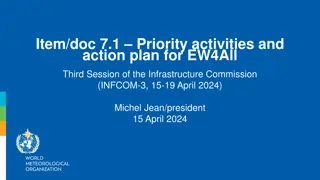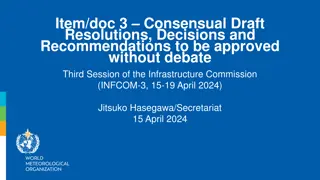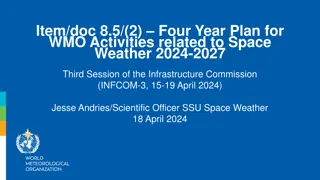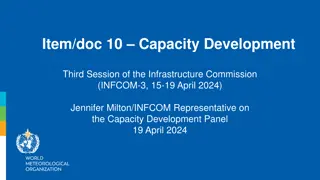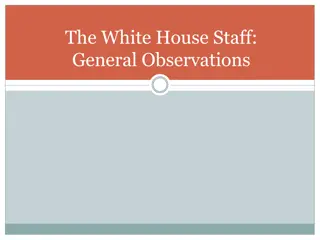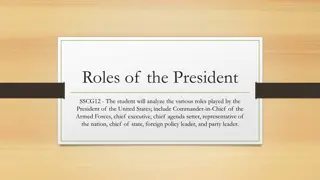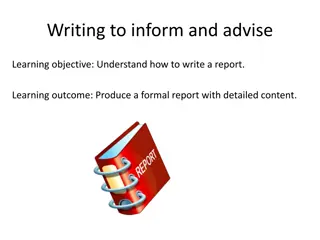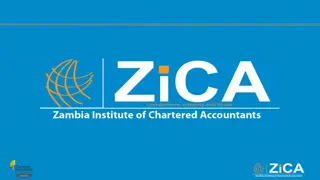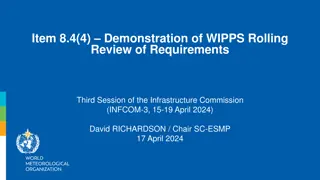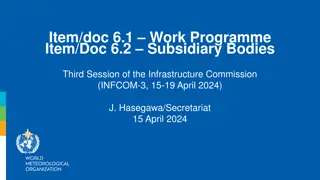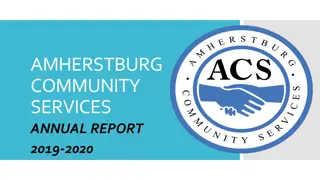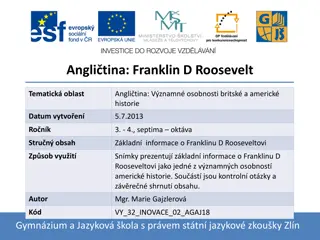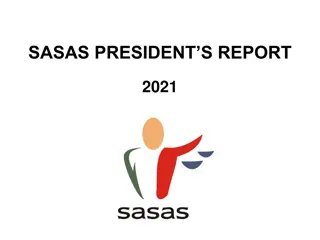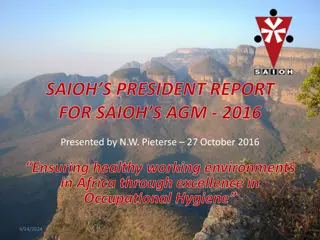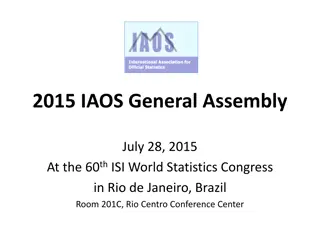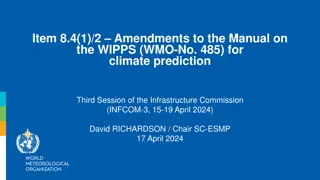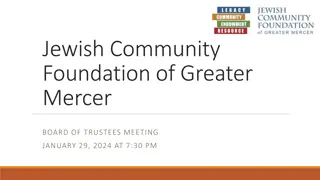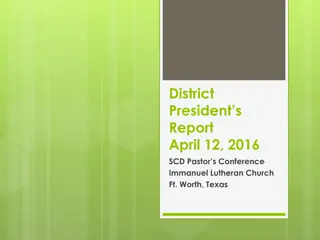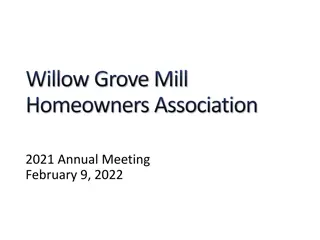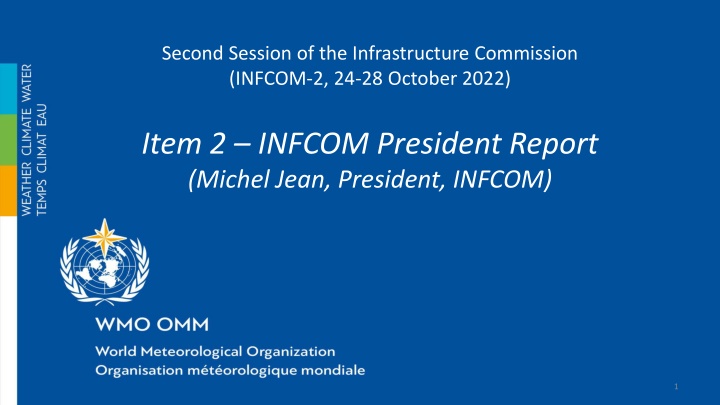
Vision 2030: Enhancing Resilience and Sustainable Development
The report highlights the establishment and key appointments within the Infrastructure Commission (INFCOM), focusing on responding to the World Meteorological Organization's (WMO) Strategic Plan for 2030. It emphasizes enhancing preparedness for extreme weather events, supporting climate-smart decision-making, and delivering user-oriented services. The core values of collaboration, inclusiveness, and diversity are emphasized, with a focus on providing essential information and services to developing countries. The report also outlines long-term goals and overarching priorities to strengthen the Earth system observations, research, and service delivery capacities.
Download Presentation

Please find below an Image/Link to download the presentation.
The content on the website is provided AS IS for your information and personal use only. It may not be sold, licensed, or shared on other websites without obtaining consent from the author. If you encounter any issues during the download, it is possible that the publisher has removed the file from their server.
You are allowed to download the files provided on this website for personal or commercial use, subject to the condition that they are used lawfully. All files are the property of their respective owners.
The content on the website is provided AS IS for your information and personal use only. It may not be sold, licensed, or shared on other websites without obtaining consent from the author.
E N D
Presentation Transcript
Second Session of the Infrastructure Commission (INFCOM-2, 24-28 October 2022) Item 2 INFCOM President Report (Michel Jean, President, INFCOM) 1
All experts in INFCOM groups and teams
Management Group
Second Session of the Infrastructure Commission (INFCOM-2, 24-28 October 2022) Supplementary Slides 4
Outline 1. INFCOM responding to WMO Strategic Plan 2. INFCOM Terms of Reference 3. Transition Team 4. Terms of Reference of Standing Committees 5. Terms of Reference of Study Groups 6. Work programme of the Commission 5
Introduction INFCOM and SERCOM established by Congress through Resolution 7 (Cg-18) Congress also elected INFCOM Commission Presidents and vice-Presidents: Michel Jean (Canada), President Bruce Forgan (Australia), vice-President, former CIMO president Silvano Pecora (Italy), vice-President, former Chy VP Nadia Pinardi (Italy), vice-President, former JCOMM co- chair 6
WMO Strategic Plan By 2030, a world where all nations, especially the most vulnerable, are more resilient to the socioeconomic impact of extreme weather, climate, water and other environmental events, and empowered to boost their sustainable development through the best possible services, whether over land, at sea or in the air. VISION 2030 Enhancing preparedness for, and reducing losses of life and property from hydrometeorological extremes Supporting climate-smart decision-making to build resilience and adaptation to climate risk Enhancing socioeconomic value of weather, climate, hydrological and related environmental services OVERARCHING PRIORITIES Accountability for Results and Transparency CORE VALUES Collaboration and Partnership Inclusiveness and Diversity LONG-TERM GOALS Better serve societal needs Delivering authoritative, accessible, user-oriented and fit- for-purpose information and services Enhance Earth system observations and predictions Strengthening the technical foundation for the future Advance targeted research Leveraging leadership in science to improve understanding of the Earth system for enhanced services Close the capacity gap Enhancing service delivery capacity of developing countries to ensure availability of essential information and services Strategic realignment of WMO structure and programmes Effective policy- and decision-making and implementation 2.1 Optimize the acquisition of observation data through the WMO Integrated Global Observing System 3.1 Advance scientific knowledge of the Earth system 4.1 Address the needs of developing countries to enable them to provide and utilize essential weather, climate, hydrological and related environmental services 5.1 Optimize WMO constituent body structure for more effective decision-making 1.1 Strengthen national multi- hazard early warning/alert systems and extend reach to better enable effective response to the associated risks STRATEGIC OBJECTIVES 3.2 Enhance the science-for- service value chain ensuring scientific and technological advances improve predictive capabilities 5.2 Streamline WMO programmes 2.2 Improve and increase access to, exchange and management of current and past Earth system observation data and derived products through the WMO Information System 2020-2023 FOCUS 5.3 Advance equal, effective and inclusive participation in governance, scientific cooperation and decision- making 1.2 Broaden the provision of policy- and decision- supporting climate information and services 4.2 Develop and sustain core competencies and expertise 3.3 Advance policy-relevant science 4.3 Scale-up effective partnerships for investment in sustainable and cost- efficient infrastructure and service delivery 1.3 Further develop services in support of sustainable water management 2.3 Enable access and use of numerical analysis and prediction products at all temporal and spatial scales from the WMO seamless Global Data Processing and Forecast System 1.4 Enhance the value and innovate the provision of decision-supporting weather information and services 7
TECHNICAL COMMISSION Management Team (President, Vice-presidents, Chairs of SCs) Standing Committee Standing Committee Standing Committee Study Group Study Group Expert Team Expert Team Expert Team Exploratory Work Innovation Expert Team Expert Team Expert Team Normative Work Systems and Services Expert Network 8
Infrastructure Commission ToR General Mandate The Commission shall contribute to: Development & implementation of globally coordinated systems for acquiring, processing, transmitting and disseminating Earth system observations, and related standards Coordination of production & use of standardized analysis & model forecast fields Development & implementation of sound data & information management practices for all WMO Programmes & associated application and services areas The Commission shall promote the development of integrated systems to cover all application areas wherever possible 9
Infrastructure Commission ToR Specific Terms of Reference a) Development and maintenance of WMO normative material related to Integrated observing systems, Data transmission and dissemination systems, Data management systems, and Data processing and forecast systems b) Common infrastructure and systems attributes c) Assistance to Members to enhance systems capabilities and enable effective implementation and compliance d) Cooperation and partnership 10
President & vice-presidents Coordinators: C-SAT, C-DATA, C-ENG, C-HESM INFCOM working structure TT-GBON SC-IMT Info. Mgmt & technology SC-ESMP Modelling & Prediction SC-MINT Measurement, Instr. & Traceability SC-ON Obs. networks AG-GCW Cryosphere SG-OOIS Ocean infrastructure SG-DIP Data policies JSG-GCOS SG-GBON SG-CRYO
Management Group President & vice presidents Michel Jean, Bruce Forgan, Nadia Pinardi, Silvano Pecora Chairs & vice-chairs of Standing Committees, Advisory Groups and Study Groups SC-MINT: Bruce Hartley, Janice Fulford, SC-ON: Estelle Grueter, Sid Thurston, SC-IMT: Remy Giraud, Jeremy Tandy, SC-ESMP: David Richardson, Hamza Kabelwa AG-GCW: Arni Snorrason, Shawn Marshall SG-DIP: Sue Barrell, Silvana Alcoz, SG-OOIS: Paula Etala, R. Venkatesan, SG-GBON: Stefan Klink, Pascal Waniha, SG-CRYO: Arni Snorrason, Shawn Marshall Coordinators C-SAT: Peng Zhang, C-HESM: Narendra Tuteja, C-DATA: Sue Barrell, C-ENG: Yoshiaki Sato
Standing Committee on Earth Observing Systems and Monitoring Networks (SC-ON) Responding to the WMO Convention, article 2(a) WMO, Standing Committee activities include: Develop & maintain relevant WMO regulatory and guidance material (e.g. WMO-No. 1160) Provide technical guidance with regard to translating WMO standard practices & procedures into operational advice tailored to the needs of individual Member countries and territories Gather & review observational user requirements, assess & advise on gaps, and make proposals on implementation, planning & operational management of observing networks Evolve WMO Application Areas within the Rolling Review of Requirements to reflect the needs of Earth System monitoring & prediction Assist & guide Members to design, evolve, optimize & implement integrated global and regional observing networks and their surface- and space-based components, in collaboration with relevant groups and partner organizations Guide development, implementation, operation & maintenance of WIGOS tools (e.g. OSCAR, WDQMS) Provide necessary assessments or facilitate and guide Members for undertaking such assessments to help enhance their capabilities and overall data availability Provide performance monitoring of the observing networks Coordinate requirements for assignment and use of radio frequencies for all WMO Application Areas, including for meteorological telecommunications, instruments, sensors Coordinate with SERCOM, RB, and RAs, engage and coordinate with other relevant activities of WMO and of external organizations 15
Standing Committee on Measurements, Instrumentation and Traceability (SC-MINT) Responding to the WMO Convention, article 2(a) WMO, Standing Committee activities include: Promote innovation in measurement technologies, techniques and integrated solutions, and provide guidance for their implementation in all environments Develop and maintain effective standards, other regulatory and guidance material related to instrumentation and measurement practices, supporting the deployment of sustainable, reliable and cost-effective measurement systems Establish suitable mechanisms to ensure the traceability of measurements to recognized standards Conduct intercomparisons to characterize the quality of measurements, including for measurements originating from non-traditional data sources Conduct outreach activities, support capacity development and community of practices in the field of environmental measurements, traceability and instrumentation, in collaboration with Regional Training Centres Develop mechanisms for the assessment of compliance with measurement regulations, and assess compliance of WMO designated measurement-related centres Engage with other WMO structures&programmes, and international organizations 16
Standing Committee on Information Management and Technology (SC-IMT) The Standing Committee will focus on the normative work and technical systems required to achieve Objective 2.2 of the WMO Strategic Plan: {to} Improve and increase access to, exchange and management of current and past Earth system observation data and derived products through the WMO Information System Gather and review requirements across user programmes, assess and advise on gaps and solutions for meeting user needs in new information and communication technologies for all disciplines and WMO application areas, and make proposals on implementation, planning and operational management of the WMO Information System (WIS); Lead the continuous development of WIS to support efficient and effective exchange of data and information among WMO Members and with partner organizations and private sector; facilitate members to discover and get access to fit-for-purpose data; Develop and update regulatory and guidance material relating to exchange of observations and other meteorological and related data and information, information life-cycle management, information and telecommunication technology, cybersecurity, operations management, data and metadata standards, Develop and support Members in the implementation of unified practices for information management Provide technical guidance on archiving, rescue and digitization of historical data and products derived from current and past observations, and on making these data discoverable and accessible through WIS; With the Regional Associations, monitor and review the performance of WIS and use of globally exchanged data and coordinate the provision of technical support and interaction between WIS centres; Monitor compliance with international and WMO information management, cybersecurity and technology standards and practices in WIS and promote a culture of compliance with standards and relevant regulatory material among all Members; Contribute to the development and implementation planning of infrastructure of partner international organizations; 17
Standing Committee on Data Processing for Applied Earth System Modelling and Prediction (SC-ESMP) Responding to the WMO Convention, article 2(a) WMO, SC-ESMP activities include: Develop relevant regulatory and guidance material, in particular the Manual on the Global Data Processing and Forecasting System (WMO-No. 485) its Guide (WMO-No. 305); Respond to new and evolving WMO programmerequirements, and in collaboration with the Research Board, Services Commission and other Constituent Bodies (Resolution 58, Cg-18), develop and support the implementation of the seamless GDPFS, taking into consideration related initiatives such as the Climate Services Information System and the Global Hydrological Status and Outlook System (HydroSOS); In collaboration with the other Standing Committees of the Infrastructure Commission, and with the Services Commission and Research Board, and considering the Rolling Review of Requirements, gather and review requirements across user programmes, assess and advise on gaps and solutions for meeting user needs in numerical analysis and Earth system prediction products for all disciplines; In collaboration with the Research Board and Services Commission, support the advancement and operationalization of probabilistic forecasting and Earth system modelling and prediction; Support and enhance the capabilities of all WMO Members to benefit from impact-based and probabilistic products, and historical data including analyses and reanalysis model output; Support to emergency response activities to Members and partner organizations (the International Atomic Energy Agency (IAEA), the Comprehensive Nuclear-Test-Ban Treaty Organization (CTBTO), the International Civil Aviation Organization (ICAO), etc.); In collaboration with regional associations, monitor and review the performance and application of the GDPFS and promote a culture of compliance with standards and relevant regulatory material among all Members; Any activities necessary to support the implementation of constituent body [policy] decisions related to analysis, modelling and prediction data, including the sharing of model outputs data; Engage with other WMO structures and programmes, co-sponsored programmes and related international partner organizations to coordinate all relevant activities. In collaboration with regional associations (RAs) and regional training centres (RTCs), build capacity among developing Members on the use and interpretation of model output, and the development of model analysis and forecast. 18
Study Group on Data Issues and Policies (SG-DIP) With reference to Resolutions 55 and 56 (Cg-18) and Resolution 2 (EC-71): Conduct a comprehensive and detailed review on the implementation and the benefit of current WMO data policy; To provide the Policy Advisory Committee (PAC) with analysis of WMO data policies, including funding mechanism, to support and inform their review. To continue the analysis of the emerging data issues and their impacts, ; To consider new approaches to encourage sharing of commercially sourced data, crowd-sourced data and social media data, in order to allow greater access to non-traditional sources of data or data not owned by governments, as well as to foster greater reciprocity within the WMO community; 19
Study Group on the Ocean Observations and Infrastructure System (SG-OOIS) This Study Group will provide a mechanism to: Engage with Members in all regions and review and clarify their ocean requirements related to ocean observations including for the safety of life at sea, and climate prediction and monitoring, in coordination with SERCOM SC-MMO, Develop a rationale demonstrating benefits of ocean modelling, including coupled Earth System models, NWP and climate prediction, in coordination with the INFCOM SC-ESMP ; Help establish efficient functional connections between GOOS, GCOS, GCW, GAW, WIGOS, and WIS Identify the observations needed to support these models, In coordination with the INFCOM SC-ON and SG- GBON; Assess capabilities of Members with regard to the use of ocean data and ocean observing for services, and explore capacity development activities; Promote stronger engagement of Members , especially those in developing countries, in GOOS; Contribue to the GOOS Strategy 2030 and GOOS Implementation Roadmap and address the expected outputs from the joint WMO-IOC Strategy for ocean data management. 20
Study Group on Implementation of the Global Basic Observing Network (SG-GBON) GBON is a major new policy initiative approved by Cg-18 that reaffirms the commitment of the WMO Members to the international exchange of critical observational data to support the NWP systems that underpin all of WMO activities in the areas of weather, climate and water. Expected outputs: Draft provisions of the Manual on the WMO Integrated Global Observing System (WMO-No. 1160) regarding the implementation of the GBON, which will clarify international requirements for the exchange of observations and respective obligations of the Members in this regard, to be submitted to EC-72 for approval; Proposal for a process for nomination, review and approval of the composition of the GBON to be submitted to EC-72 for approval; Proposal for initial composition of the GBON submitted to Members for their review, and then for approval to Extraordinary World Meteorological Congress in 2021. 21
Study Group on Cryosphere Crosscutting Functions (SG-CRYO) Contributing to the Strategic Objective of enhancing Earth system observations and predictions in support of services, this Study Group will: Assess and report on the cryosphere crosscutting requirements across all WMO strategic goals; Provide recommendations on the integration within the Terms of Reference of the new governance structures of WMO, of the activities of the Global Cryosphere Watch (GCW) and those focusing on polar and high mountain areas; Foster greater reciprocity within the WMO community and with current and emerging partners in the field of cryosphere; Assess synergies with the Global Climate Observing System (GCOS), the World Climate Research Programme (WCRP), and other relevant programmes and partners; Recommend an effective coordination mechanism within the current governance structure, within the framework of GCW. 22
Joint Study Group on the Global Climate Observing System (JSG-GCOS) This Study Group will provide a mechanism to develop proposals for an optimal governance structure for GCOS that: Ensures that the GCOS programme will continue to provide guidance & support on climate to relevant observing systems to efficiently & consistently meet climate related needs, including driving further developments to address gaps and deficiencies: in the framework of the WMO Strategic and Operating Plans and WIGOS. supporting the WMO Earth System Approach and Climate Services in particular GCW, GAW, WCRP, and other relevant WMO activities (e.g. hydrology, research, DRR, space program); and also, the observation systems of partner agencies and other stakeholders such as the IOC-led GOOS, the CEOS/CGMS Joint Working Group on Climate, and the various terrestrial and biospheric networks to ensure consistent, coherent observations of the climate system; Recognises the crosscutting nature of GCOS across WMO; Aligns the GCOS panels and GCOS cooperation mechanism with the new GCOS governance structure, WMO and other major observing systems; Includes representation of sponsors and partners of GCOS, especially major observing systems, stakeholders (e.g. CEOS and CGMS, Copernicus services and UNFCCC) and donors; Takes account of the views and strengthens links with sponsors and partners of GCOS and other relevant organizations (e.g. GEO and other UN Rio Conventions and MEAs) 23
New working structure proposed (draft Resolution 5.2/1 (INFCOM-2) Bodies no longer needed: Study Group on Data Issues and Policies (SG-DIP) Study Group on Implementation of the Global Basic Observing Network (SG- GBON) Study Group on the Ocean Observations and Infrastructure System (SG-OOIS) Study Group on Cryosphere Crosscutting Functions (SG-CRYO) Joint Study Group on the Global Climate Observing System (SG-GCOS) New Bodies: Joint Study Group on WMO Greenhouse Gas Monitoring (JSG-GHG) Advisory Group on the Oceans (AG Ocean) Coordinator on the implementation of the WMO Unified Data Policy (C-DATA)
Work Programme (Draft Resolution 5.1/1 (INFCOM-2)) Aligned with WMO Strategic and Operating Plans 2020-2023 Responds to Cg-Ext(2021) and EC-75 Decisions Follows up from Resolution 6 (INFCOM-1) former version of the work programme- which brought together elements from CIMO, CBS, CCl, CHy, GCOS, GCW and ICG-WIGOS Focus on second intersessional period 2023-2024 Outlook for 2025-2026 Deliverable-based approach Management Group tasked to develop work programme on the basis of deliverables in Annex to draft Resolution 5.1/1 (INFCOM-2) Prioritization of deliverables will be made, based on: benefit to members prior decisions of Congress or EC risk of not proceeding resource demands 25
INFCOM [normal] Sessions INFCOM-1 (see abridged final report, WMO-No. 1251) Part I (April/May 2020) Consultation in writing Working Structure and Work Programme of SCs & SGs Part II (9-13 Nov. 2020) Virtual Session Urgent & priority decisions for EC-73/Cg-Ext Part III (12-16 April 2021) Virtual Session Other decisions for EC-73/Cg-Ext. INFCOM-2 (24-28 October 2022) Hybrid Session Responding to CG-Ext(2021) and EC-75 Decisions Prepare some decisions of EC-76 and Cg-19 26
Some topics on interest to both INFCOM and SERCOM Data & information requirements across value chain Products & information requirements Data requirements for data processing & forecasting systems Research requirements (understanding geophysical processes to improve DPFS) Observational user requirements (RRR) WMO Unified Data Policy Greenhouse gas monitoring Terminology, WMO Standard Vocabulary Relationship with GEO across the whole value chain. Risk management in relation to COVID-19 Preparation of the INFCOM and SERCOM 1&2 Sessions, including lessons learned. Joint Conference on "The UN Global Early Warning Initiative for Climate Adaption: Early Warnings For All (22 Oct. 2022) Governance web pages, calendar of meetings of interest to both Commissions. 27
Thank you 28

